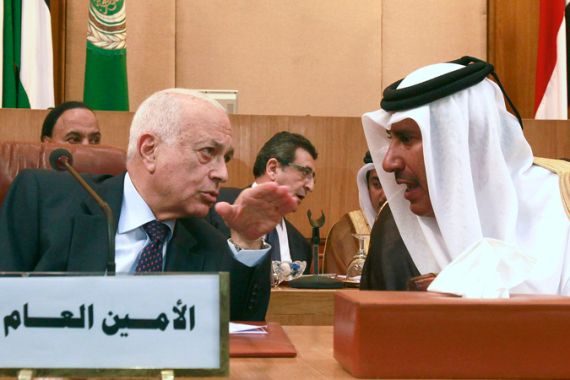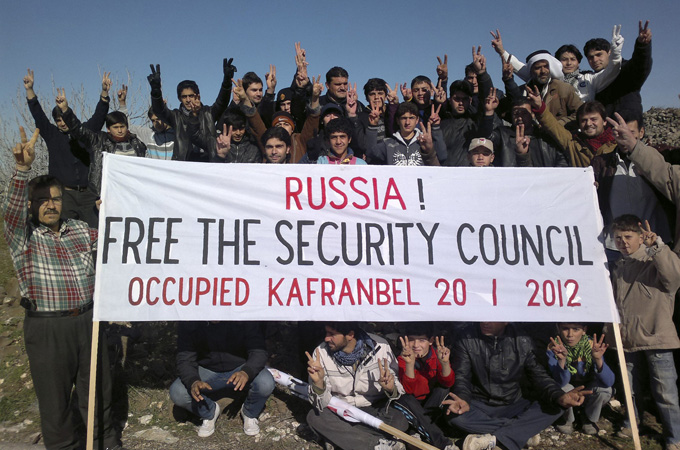Arab League to take Syria peace plan to UN
Bloc’s chief and Qatar’s PM will submit plan calling for Bashar al-Assad to step down to UN Security Council on Monday.

 |
| Syrians urge Russia to stop its vetoes of UN proposals for action against the Syrian government’s crackdown [Reuters] |
The Arab League chief has reportedly said that a peace plan that aims to end Syria’s political crisis will be submitted to the United Nations Security Council early next week.
Nabil Elaraby, the secretary-general of the Arab League, told reporters in Cairo on Thursday that the meeting with UN officials will be held on Monday in New York.
The plan calls for President Bashar al-Assad to hand power to his deputy and clear the way for a unity government within two months.
Elaraby and Sheikh Hamad bin Jasem Al Thani, Qatar’s prime minister who heads the league’s Syria committee, would depart for New York on Saturday.
Al Jazeera’s Zeina Khodr, reporting from Beirut, said endorsement from the UN would “embolden” activists inside Syria.
“[The Arab League] is hoping that there will be a vote later in the week.”
She also said that Russia, a veto-wielding member of the UN Security Council, wants dialogue, a peaceful resolution to Syria’s crisis and is opposed to any military intervention, such as that which occurred in Libya.
Assad and his government have fiercely rejected the Arab League proposal, accusing the league of being part of a “conspiracy” against Syria.
The Arab League has been pushing for a UN Security Council resolution to end the Syrian government’s violent crackdown on protesters, which has killed thousands of people since demonstrations calling for reform began in March.
Al Thani told Al Jazeera on Tuesday that elevating the Syria issue to the UN was “the only option”.
Elaraby’s latest announcement on Syria came after Gulf Arab observers, deployed to Syria as part of a previous Arab League initiative, began to pull out of Syria on Wednesday after their governments said they were “certain the bloodshed and killing of innocents would continue”.
“The departure of the GCC [Gulf Co-operation Council] countries will not have an impact on the mission’s work. We are all professionals here and we can do the job,” said Al Thani.
GCC withdrawal
The remaining observers in Damascus pledged to pursue the much-criticised observer mission, now extended until February.
“The departure of the GCC countries will not have an impact on the mission’s work,” a senior Arab monitor said.
“We are all professionals here and we can do the job. We were around 170 or so and now with them leaving we are around 120. We need more monitors of course and more will come soon to replace those who left.”
Observers from Kuwait, the United Arab Emirates and Bahrain have left the Syrian capital and those from other Gulf states were expected to leave soon.
The Syrian opposition has criticised the observer mission, saying it is giving diplomatic cover to the Damascus leadership to continue its crackdown on dissent.
More than 800 people have been killed in the country since the observers arrived, according to activist groups.
Russia resistance
On Wednesday, Russia said it would continue to resist sanctions against Syria, but that it is “open to constructive proposals”, as the Arab League continues to seek UN support for a plan to end the crackdown by Assad’s government.
“We are open to constructive proposals that go in line with the set task of ending violence,” Sergei Lavrov, the Russian foreign minister, said, following talks with his Turkish counterpart Ahmet Davutoglu, in Moscow.
He said Russia is open to changes to the resolution it has proposed to the Security Council that blames both the Syrian government and the opposition for the use of force.
But he insisted that Moscow would not back UN action granting the global body’s approval of economic sanctions already adopted against its traditional ally by the European Union and the US.
Any resolution backed by Russia “must firmly record that it cannot be used or interpreted to justify anyone’s outside military intervention in the Syria crisis,” he added.